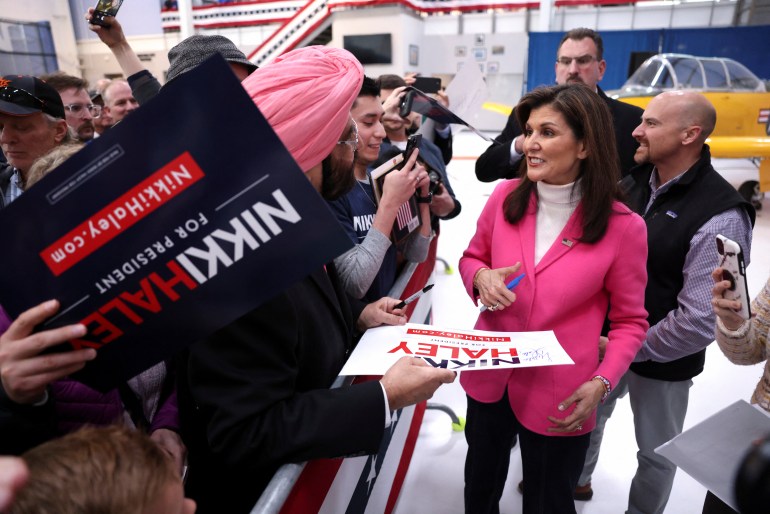Table of Contents
President Joe Biden and former President Donald Trump have easily won their parties’ primaries in Michigan but results show that both candidates have cause for concern in their bids to win the swing state in November amid a rising number of “uncommitted” voters.
Here are some key takeaways from the Michigan primaries:
1. Biden, Trump each move closer to presidential nomination
Michigan was the last major state to hold a primary before Super Tuesday next week and both sides were watching closely for any early indications for the November general election in one of the few genuine swing states left in the country.
Biden has now cruised to victories over lesser-known Democrat candidates in South Carolina, Nevada and New Hampshire. The latest result shows that his standing is still strong in Michigan as well.
Trump has swept all five of the early state Republican contests for the presidential nomination, including South Carolina, the home state of rival Nikki Haley. He heads towards Super Tuesday, when 15 states and one territory will hold Republican nominating contests, as the overwhelming favourite.
Michigan was one of three so-called blue wall states, including Wisconsin and Pennsylvania, that Trump won in 2016.

2. Democrats express anger over Israel’s war on Gaza with ‘uncommitted’ vote
Michigan has become the focal point of Democratic frustration over the White House’s handling of Israel’s war on Gaza. It has the largest concentration of Arab Americans in the nation.
That anger came through loud and clear on Tuesday as thousands of voters marked “uncommitted” on their ballot in the Democratic primary. Biden still dominated the primary, but the result could be a concern in a state he won by less than 3 percent in 2020 and likely can’t afford to lose this year.
Listen to Michigan, a campaign started and spearheaded by predominantly younger Arab and Muslim organisers, led a push for Democrats to choose “uncommitted” in the primary as a protest vote.
“My message for Biden is that you have voters here in Michigan for whom his handling of Gaza is the top issue on our mind – so many of us are survivors of war ourselves,” Abbas Alawieh, spokesman for Listen to Michigan told Al Jazeera.
“It’s long past time for the President to do two things; one, call for a permanent ceasefire and, two, stop funding the genocide. Both of those demands are urgent, there are especially urgent for me as someone who was a congressional staffer on January 6, and who knows how dangerous Donald Trump is.
“It’s precisely for that reason that we set our campaign goal to be 10,000 votes because in 2016, the last time Donald Trump won, he won by 10,000 votes.
“Say it publicly: President Joe Biden, what are you waiting for, 13,000 children gone, using our taxpayer funds and bombs, it needs to stop and he needs to listen to Michigan,” Alawieh said.

With almost half of Democrat votes counted, the number of “uncommitted” voters was already more than 58,000, according to Edison Research, far exceeding that target of 10,000.
According to analysts, this protest could turn into a serious problem for Biden during the presidential election.
“It could be a significant problem … [if protesters] decide not to come out when the races against Donald Trump vs Joe Biden [starts],” John Feehery, a partner at EFB advocacy, a lobbying and strategic communications firm and political commentator, told Al Jazeera.
“This is going to be a really key test for Joe Biden, I think that’s why you see him trying to put additional pressure on Netanyahu and the Israelis to get these deals and kind of clean this war up or get this war over with,” he added.
3. Some Republicans still oppose Trump
Despite Trump’s clear victory in Michigan, Haley still saw significant support from the swing state’s Republicans.
Some of her best results came in Oakland and Kent counties, where Democrats have been gaining ground in recent years, contributing to their recent statewide success. She also performed better in counties where the state’s largest universities are located – in Washtenaw and Ingham. She secured 26.5 percent of the vote.
The former president has appeared in Michigan regularly in the eight years since he became president, while Haley only began campaigning in the state over the weekend.
But securing the backing of around 30 percent of Republicans in Michigan who either voted for Haley or chose the GOP’s “uncommitted” option remains a challenge for Trump, political analysts say. Despite being close to winning his third presidential nomination in a few weeks, a significant group either opposes him or remains unconvinced.
Feehery said: “Trump has got some issues in some of the more suburban countings surrounding Detroit, where the higher income do not like Trump, and they do like Nikki Haley; he also has some problems in the west side of the state, and he has to shore that up because he needs a united party to be able to beat Joe Biden in the general election.”
4. However, Haley is running out of time
Haley has promised to continue her campaign at least until after Super Tuesday on March 5, pointing to a not-insignificant swath of Republican primary voters who have continued to support her despite Trump’s tightening grip on the Republican party.
She also raised nearly $3m more than Trump’s primary campaign committee in January. That indicates that some donors continue to look at Haley, despite her “long-shot” prospects, as an alternative to Trump, should his legal problems imperil his chances of becoming the nominee.
Nevertheless, Haley once again fell short of securing the decisive victory that could shift momentum in her favour. Instead of expanding, her margins are diminishing as time dwindles.


